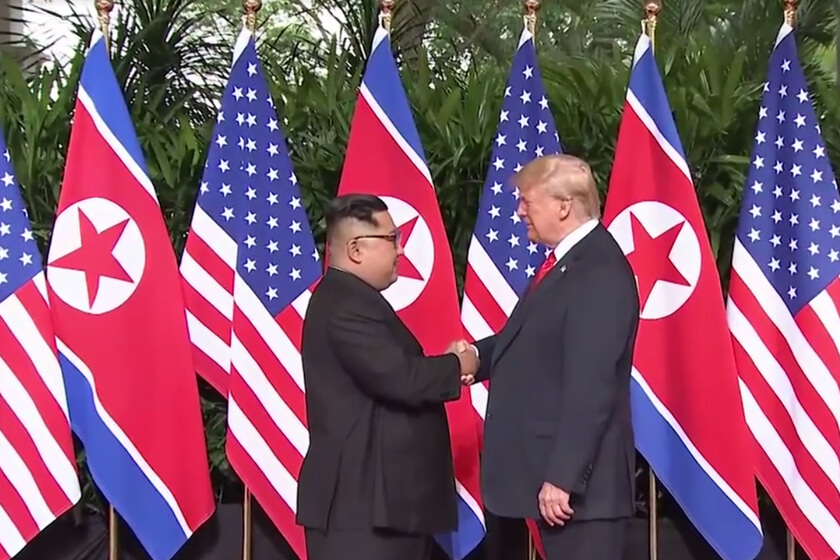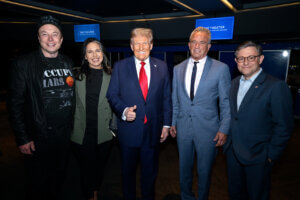West Long Branch, NJ – Both Donald Trump and Kim Jong Un came out of their historic meeting this week looking stronger, according to a national Monmouth University Poll conducted on Tuesday and Wednesday evenings. The public is somewhat optimistic that these talks could lead to a reduction of the North Korean nuclear threat, but they are also more likely to feel that Kim’s nation fared better than the U.S. The poll also finds that Trump’s overall job performance rating is slightly better than it was just over a month ago.
Opinion of the president’s job performance may have been helped by the talks with the North Korean leader. Trump’s overall rating currently stands at 43% approve and 46% disapprove. The last time Trump’s disapproval rating was less than 50% in Monmouth’s polling was last September. The president’s current rating is better than his 41% approve and 50% disapprove rating at the end of April, although this shift is still within the polling margin of error.
Most Americans (71%) say that the recent meeting between Trump and Kim was a good idea, including 93% of Republicans, 74% of independents, and 49% of Democrats. Only 20% say it was a bad idea. This positive feeling is somewhat higher than in late April, when 63% said the prospect of having such a meeting was a good idea.
Just under half of the public (46%) says the meeting made Trump look stronger on the world stage compared with only 13% who say it made him look weaker. Another 38% say the meeting did not change Trump’s international stature. Reviews are pretty much the same for North Korea’s leader, though. Just under half (45%) say the meeting made Kim look stronger on the world stage compared with only 9% who say it made him look weaker. Another 39% say the meeting did not change Kim’s international stature.
Interestingly, but not surprisingly, 78% of Republicans feel the meeting made Trump look stronger and 42% say it made Kim look stronger. On the other hand, only 22% of Democrats feel the meeting made Trump look stronger but 50% say it made Kim look stronger.
“The event was clearly a good photo op for both leaders, but the top goal from the U.S. perspective was reducing the nuclear threat posed by Kim’s regime. The public is more optimistic than pessimistic that this will be an outcome of these talks, but only just slightly,” said Patrick Murray, director of the independent Monmouth University Polling Institute.
Half of the public (51%) say it is likely that this meeting will help reduce the nuclear threat posed by North Korea, while 39% say this is not a likely outcome. The vast majority of Republicans are optimistic about this meeting leading to a lessening of the nuclear threat (77% likely to 16% not likely) while less than half as many Democrats agree (33% likely to 55% not likely). Independents are more divided between saying that reducing North Korea’s nuclear threat is (49%) or is not (42%) likely as a result of this meeting.
“While the president looked good, few Americans believe our country actually gained the upper hand. In fact, more feel North Korea made out better,” said Murray.
When considering who benefited more from these talks, 39% of the American public say both countries gained equally and a similar 38% say North Korea gained more. Only 12% say the United States left the meeting with a net gain. When asked the opposite question of who gave up more concessions at these talks, 33% say both countries did equally, 29% say the United States conceded more, and 19% say North Korea conceded more.
One of the major U.S. concessions was a suspension of joint military exercises with South Korea, but only 47% of the public have heard about this detail. The public is divided on whether suspending these exercises with the South is a good idea (38%) or bad idea (42%), with 19% being unsure. Among those who had already heard about this concession, 46% say it is a good idea and 43% say it is a bad idea. Among those who were not previously aware of this concession, 31% say it is a good idea and 42% say it is a bad idea.
In the end, public faith in Trump’s ability to deal with North Korea remains divided. Currently, 37% of Americans are confident and 36% are not confident in the president’s ability to handle the North Korea situation. Another 28% are unsure. In late April, 37% were confident, 40% were not confident and 23% were unsure. This divide in confidence has held fairly steady since Monmouth first asked the question in August 2017.
“The public still has a lot of questions about the North Korea situation that were not answered by this meeting,” said Murray.
Just over half the public (53%) report having heard a lot about the meeting between Trump and Kim, while another 40% have heard a little and 8% have heard nothing about it. There are a few differences of opinion on the questions in this poll based on how much the public has heard about the meeting. Of note is that those who have heard a lot about the meeting (45%) are more likely to be confident in Trump’s ability to deal with North Korea than those who have not heard a lot (29%). However, there is no difference between the two groups in the number who say they have no confidence in Trump on this issue (37% and 34%, respectively). At the same time, 45% of those who have heard a lot about the meeting feel that North Korea gained more in the end, compared to 31% of those who did not follow it closely.
The Monmouth University Poll was conducted by telephone from June 12 to 13, 2018 with 806 adults in the United States. The results in this release have a margin of error of +/- 3.5 percentage points. The poll was conducted by the Monmouth University Polling Institute in West Long Branch, NJ.
QUESTIONS AND RESULTS
(* Some columns may not add to 100% due to rounding.)
1. Do you approve or disapprove of the job Donald Trump is doing as president?
| TREND: | June 2018 | April 2018 | March 2018 | Jan. 2018 | Dec. 2017 | Sept. 2017 | Aug. 2017 | July 2017 | May 2017 | March 2017 |
| Approve | 43% | 41% | 39% | 42% | 32% | 40% | 41% | 39% | 39% | 43% |
| Disapprove | 46% | 50% | 54% | 50% | 56% | 49% | 49% | 52% | 53% | 46% |
| (VOL) No opinion | 11% | 9% | 8% | 8% | 12% | 11% | 10% | 9% | 8% | 11% |
| (n) | (806) | (803) | (803) | (806) | (806) | (1,009) | (805) | (800) | (1,002) | (801) |
[Q2-4 held for future release.]
5. President Trump recently met with the North Korean leader Kim Jong Un. How much have you heard about this – a lot, a little, or nothing at all?
| June 2018 | |
| A lot | 53% |
| A little | 40% |
| Nothing at all | 8% |
| (n) | (806) |
6. Do you think Trump having this meeting was a good idea or bad idea?
| June 2018 | April 2018* | |
| Good idea | 71% | 63% |
| Bad idea | 20% | 28% |
| (VOL) Don’t know | 9% | 8% |
| (n) | (806) | (803) |
* April ’18 question was asked regarding a potential meeting between Trump and the North Korean leader.
7. Are you confident or not confident in President Trump’s ability to deal with the North Korea situation, or are you not sure? [If NOT SURE: Do you lean more toward feeling confident or more toward feeling not confident?]
| TREND: | June 2018 | April 2018 | Jan. 2018 | Aug. 2017 |
| Confident | 37% | 37% | 41% | 42% |
| Not sure, lean confident | 9% | 8% | 6% | 6% |
| Not sure | 4% | 2% | 2% | 3% |
| Not sure, lean not confident | 15% | 13% | 11% | 11% |
| Not confident | 36% | 40% | 40% | 38% |
| (n) | (806) | (803) | (806) | (805) |
8. Which country do you think probably gained more from this meeting: the United States, North Korea, or both equally?
| June 2018 | |
| United States | 12% |
| North Korea | 38% |
| Both equally | 39% |
| (VOL) Neither country | 4% |
| (VOL) Don’t know | 6% |
| (n) | (806) |
9. Which country do you think gave up more concessions to the other side as a result of this meeting: the United States, North Korea, or both equally?
| June 2018 | |
| United States | 29% |
| North Korea | 19% |
| Both equally | 33% |
| (VOL) Neither country | 3% |
| (VOL) Don’t know | 16% |
| (n) | (806) |
10. Do you think this meeting made Donald Trump look stronger or weaker on the world stage, or didn’t it really change how he looks on the world stage?
| June 2018 | |
| Stronger | 46% |
| Weaker | 13% |
| Didn’t really change | 38% |
| (VOL) Don’t know | 4% |
| (n) | (806) |
11. Do you think this meeting made Kim Jong Un look stronger or weaker on the world stage, or didn’t it really change how he looks on the world stage?
| June 2018 | |
| Stronger | 45% |
| Weaker | 9% |
| Didn’t really change | 39% |
| (VOL) Don’t know | 7% |
| (n) | (806) |
12. Did you hear that President Trump agreed to suspend the United States regular joint military exercises with South Korea after this meeting, or hadn’t you heard about that?
| June 2018 | |
| Heard | 47% |
| Not heard | 53% |
| (n) | (806) |
13. Do you think suspending these joint military exercises with South Korea is a good idea or bad idea?
| June 2018 | |
| Good idea | 38% |
| Bad idea | 42% |
| (VOL) Don’t know | 19% |
| (n) | (806) |
14. Do you think it is likely or not likely that this meeting will help decrease the nuclear threat posed by North Korea?
| June 2018 | |
| Likely | 51% |
| Not likely | 39% |
| (VOL) Don’t know | 10% |
| (n) | (806) |
[Q15-28 held for future release.]
METHODOLOGY
The Monmouth University Poll was sponsored and conducted by the Monmouth University Polling Institute from June 12 to 13, 2018 with a national random sample of 806 adults age 18 and older, in English. This includes 403 contacted by a live interviewer on a landline telephone and 403 contacted by a live interviewer on a cell phone. Telephone numbers were selected through random digit dialing and landline respondents were selected with a modified Troldahl-Carter youngest adult household screen. Monmouth is responsible for all aspects of the survey design, data weighting and analysis. Final sample is weighted for region, age, education, gender and race based on US Census information. Data collection support provided by Braun Research (field) and SSI (RDD sample). For results based on this sample, one can say with 95% confidence that the error attributable to sampling has a maximum margin of plus or minus 3.5 percentage points (unadjusted for sample design). Sampling error can be larger for sub-groups (see table below). In addition to sampling error, one should bear in mind that question wording and practical difficulties in conducting surveys can introduce error or bias into the findings of opinion polls.
| DEMOGRAPHICS (weighted) |
| Self-Reported |
| 28% Republican |
| 40% Independent |
| 32% Democrat |
| 49% Male |
| 51% Female |
| 32% 18-34 |
| 34% 35-54 |
| 34% 55+ |
| 64% White |
| 12% Black |
| 16% Hispanic |
8% Asian/Other |
| 70% No degree |
| 30% 4 year degree |
Click on pdf file link below for full methodology and results by key demographic groups.




